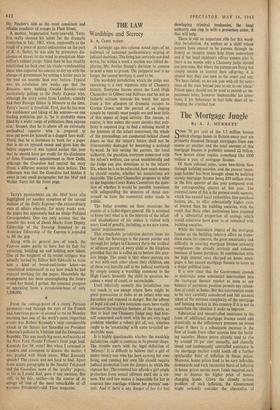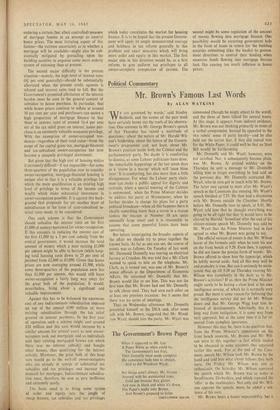The Mortgage Jungle
By A. .1. MERRETT
SOME 70 per cent of the 1.1 million houses which change hands in Britain every year are primarily financed through mortgages from one source or another and the total amount of this mortgage finance is probably around £2 billion. New houses alone require something like £500 million a year of mortgage finance.
Of these colossal sums, some two-thirds flow through building societies, and the present 'mort- gage famine' has been brought about by building society mortgage finance being £50 million down in the first quarter of this year compared with the corresponding quarter of last year. The essential cause of this is the present credit squeeze, which has caused local authorities, hire-purchase houses, etc., to offer substantially higher rates of interest than the building societies, with the result that these other institutions have creamed off a substantial proportion of savings which would otherwise have gone to or remained with building societies.
While the immediate impact of the mortgage famine on the building industry offers no imme- diate cause for concern, the great uncertainty and difficulty in securing mortgage finance seriously complicates the already intricate and arduous business of house purchase. In combination with the high interest, rates charged on house mort- gages it has caused mortgage finance to loom as a major political issue.
It is now clear that the Government intends to undertake some substantial intervention into the mortgage finance market as soon as our balance of payments position permits any relaxa- tion of credit at home. But this intervention needs to be very carefully considered and full account taken of the extreme complexity of the mortgage and housing market in this country if it is not to exacerbate the situation it seeks to improve.
Substantial and uncontrolled assistance in the form of additional mortgage finance could add drastically to the inflationary pressure on house prices if there is a subsequent increase in the flow of funds from other sources into the build- ing societies. House prices already tend to rise by around 10 per cent annually, and clumsily timed and inadequately controlled assistance to the mortgage market could touch off a further spectacular bout of inflation in house prices. Moreove, house prices tend to be very inflexible downwards and each successive burst of inflation in house prices means more funds required each year to finance the higher price of houses changing hands. Given the already serious problem of such inflation, the Government might seriously consider the alternative of enduring a certain (but albeit controlled) measure of mortgage famine in an attempt to control house prices. The most irritating aspect of this famine—the extreme uncertainty as to whether a mortgage will be available—might also be sub- stantially mitigated by prevailing upon the building societies to organise some more orderly system of rationing than at present.
The second major difficulty in the present situation—namely, the high level of interest rates (64 per cent generally)—should be substantially alleviated when the present credit squeeze is relaxed and interest rates tend to fall. But the Government's promised alleviation of the interest burden must be seen in the general context of subsidies' to house purchase. In particular, that while house prices continue to inflate at around 10 per cent per year and purchasers can secure a high proportion of mortgage finance to buy them at interest rates of around 34-4 per cent net of the tax relief grant on interest, house pur- chase is an extremely valuable economic privilege. With the exemption of owner-occupied resi- dences—regardless of their total value—from the scope of the capital gains tax, mortgage-financed and tax-subsidised owner-occupation has now become a uniquely privileged investment.
But given that the high cost of housing makes it extremely difficult—if not impossible—for some three-quarters of the population ever to consider owner-occupation, mortgage-financed housing is unique also in• that it is a valuable privilege for which the main qualification is an existing high level of privilege in terms of the income and wealth which make substantial investment in owner-occupation possible. It is against this back- ground that proposals for yet another layer of subsidisation in the form of state-subsidised in- terest rates needs to be considered.
One such scheme is that the Government should subsidise the interest rates on the first £1,000 of moneys borrowed for owner-occupation. If this amounts to reducing the interest cost of the first £1,000 by a 3 per cent subsidy from the central government, it would increase the total amount of money which a man earning £1,000 per annum might be able to borrow (while keep- ing total housing costs down to 25 per cent of income) from £2,860 to £3,090. Given that house prices are now averaging around £3,500, while some three-quarters of the population earn less than £1,000 per annum, this would still leave owner-occupation a fairly long way away for the great bulk of the population. It would, nevertheless, bring about a significant and valuable improvement.
Against this has to be balanced the enormous cost of any indiscriminate subsidisation imposed on top of the annual £100 million or more existing subsidisation through the tax relief granted on interest payments. In the first year of operation such a scheme might cost around £20 million and this cost would increase by a similar amount for several years as new owner- occupiers took out mortgages and as individuals sold their existing mortgaged houses (on which there was no interest subsidy) and bought other houses, thus qualifying for the interest subsidy. Moreover, the great bulk of this huge sum would go to the well-off owner-occupiers who are already in receipt of substantial tax subsidies and tax privileges and increase the demand for mortgages, Indiscriminate subsidisa- tion must, therefore, be seen as very inefficient and extremely costly.
The basic need is to bring some system of order and equity into the jungle of cheap finance, tax subsidies and tax privileges which today constitutes the market for housing finance. It is to be hoped that the present Govern- ment will apply its amply demonstrated courage and boldness in tax reform generally to this problem and enact measures which will bring more order and equity in this market. The first major step in this direction would be, as a first reform, to give uniform tax privileges to all owner-occupiets irrespective of income. The second might be some regulation of the amount of money flowing into mortgage finance. One possibility would be recurring government help in the form of loans in return for the building societies submitting (like the banks) to govern- ment directives to control their lending when excessive funds flowing into mortgage finance look like causing too much inflation in house prices.



































 Previous page
Previous page